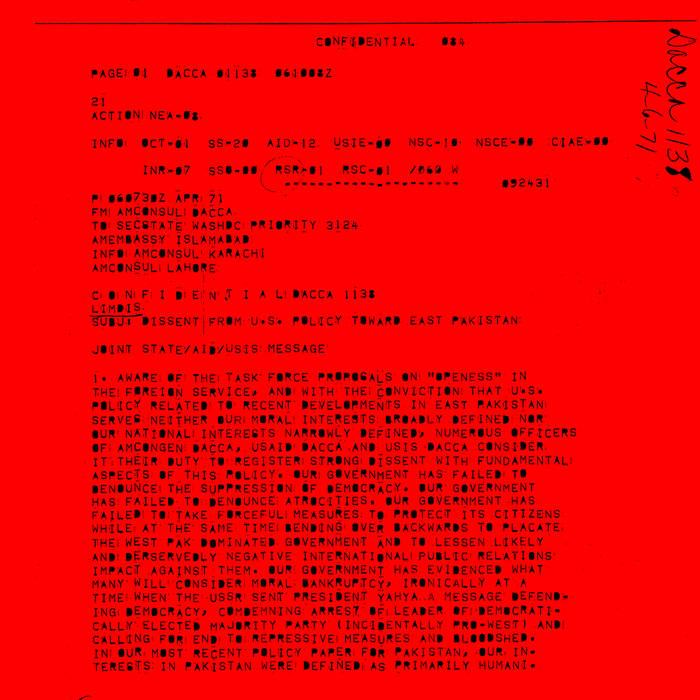“Our government has failed to denounce the suppression of democracy. Our government has failed to denounce atrocities. Our government has failed to take forceful measures to protect its citizens while at the same time bending over backwards to placate the West Pak dominated government and to lessen any deservedly negative international public relations impact against them. Our government has evidenced what many will consider moral bankruptcy …”
—?US Consulate (Dacca) Cable, Dissent from US Policy Toward East Pakistan, April 6, 1971, Confidential, 5 pp. Includes Signatures from the Department of State
On April 6, 1971, America’s senior-most diplomat in East Pakistan, Archer Blood sent a guilt-ridden telegram to Washington giving a blow-by-blow report of the violence that unfolded right in front of his eyes. The telegram signed by twenty members of the diplomatic staff was sent through the State Department’s Dissent Channel, protesting against the US Government’s policies in East Pakistan.
Archer Blood, a former Navy man, arrived in Dhaka, then East Pakistan, as the US Consul-General in 1970. When the Bangladesh genocide began, his consulate regularly reported events to the White House but received no response due to America’s alliance with West Pakistan, fuelled by President Nixon’s personal friendship with the then-President of Pakistan, General Yahya Khan, and also due to the then National Security Advisor Henry Kissinger’s desire to use Pakistan’s cordial relationship with China as a pathway to resuming American Relations with China.
The genocide that began on March 25, 1971, with the launch of Operation Searchlight, was aimed at suppressing Bengali calls for independence. Also, by then the general view of the authorities of West Pakistan was that the Bengali Muslims were “too Bengali” and their application of Islam was seen as “inferior and impure”. So, it wasn’t difficult for the Pakistan Army, nor heavy on the conscience of their leaders to carry out the Genocide at the behest of Gen. Yahya Khan who is reported to have said, “Kill three million of them, and the rest will eat out of our hands.”
When Islamabad failed to obey the mandates of their own laws and did not allow the Awami League to form the Federal Government, even after them securing a clear majority. The West Pakistan elites had no intentions of letting the control of the government shift to Bengali hands. Such discrimination led to widespread protests and violence against any non-Bengalis stranded in East Pakistan. Widespread lawlessness ensued and the Pakistan Government lost control over most parts of the province.
Using this as an excuse the Pakistan Army launched one of the bloodiest orchestrations of elimination of human life. Anthony Mascarenhas, a West Pakistani journalist wrote an article named “Genocide” in London’s Sunday Times on June 13, 1971, which said, “I saw Hindus, hunted from village to village and door to door, shot off-hand after a cursory ‘short-arm inspection’ showed they were uncircumcised. I have heard the screams of men bludgeoned to death in the compound of the Circuit House (civil administrative headquarters) in Comilla. I have seen truckloads of other human targets and those who had the humanity to try to help them hauled off ‘for disposal’ under the cover of darkness and curfew.” While this article turned the world’s opinion against Pakistan’s policies and decisively encouraged India to take action. But the US Government, in spite of being repeatedly informed by their own officials stationed in Dhaka, refused to act.
Not wanting to spoil any future chances of opening diplomatic relations with China, and owing to Nixon’s pathological dislike for Indians and his close friendship with Gen Yahya Khan, the US Government ignored the urgent and horrified tone of Blood’s telegrams, which only grew in intensity.
It is not easy to garner the courage to criticise your own government when they are your best bet for any kind of safety in a foreign country. Archer Blood’s strongly-worded efforts would have gone mostly unnoticed if it wasn’t leaked out in public.
But the Blood Telegram leak and the subsequent inaction of the US Government compelled the Indian support to the Bengali nationalism. On December 03, 1971, India declared war on Pakistan, jumping headfirst into the conflict. While for India, it was for its defence and intelligence machinery, Bangladesh on the other hand will remember it as the war that led to their freedom.
But it is interesting to note that in all of this, there was only one man who by denouncing Pakistani policy in East Bengal had everything to lose on a personal, as well as on a National level. However, he weighed his moral gains to be far superior to anything. When, Archer Blood died of arterial sclerosis in 2004, in Colorado, he wasn’t as much mourned by Americans as by Bangladesh. The Bangladesh Government even sent a delegation to Fort Collins, Colorado for his funeral. Archer Blood, purely through the exercise of his conscience transcended national boundaries and laid down the basic moral standards of American diplomacy.
War, they say, brings nothing but destruction and sorrow in its wake. But if it means self-determination and liberation for oppressed people, then we are left with little choice.
“..we have chosen not to intervene, even morally, on the grounds that the Awami conflict, in which unfortunately the overworked term genocide is applicable, is purely an internal matter of a sovereign state. Private Americans have expressed disgust. We, as professional civil servants, express our dissent with current policy and fervently hope that our true and lasting interests here can be defined and our policies redirected in order to salvage our nation’s position as a moral leader of the free world.”
—?US Consulate (Dacca) Cable, Dissent from US Policy Toward East Pakistan, April 6, 1971, Confidential, 5 pp. Includes Signatures from the Department of State

